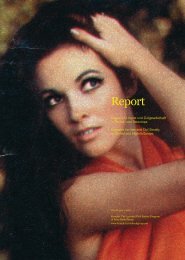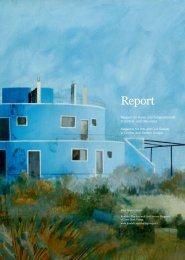Report_Issue 1/2009 - Jubiläum/ 20 Jahre Mauerfall
Report_Issue 1/2009 - Jubiläum/ 20 Jahre Mauerfall
Report_Issue 1/2009 - Jubiläum/ 20 Jahre Mauerfall
Sie wollen auch ein ePaper? Erhöhen Sie die Reichweite Ihrer Titel.
YUMPU macht aus Druck-PDFs automatisch weboptimierte ePaper, die Google liebt.
Vorwort<br />
Editorial<br />
<strong>20</strong> JAHRE<br />
MAUERFALL<br />
5 JAHRE REPORT<br />
5 JAHRE EU<br />
OST ERWEITERUNG<br />
Als <strong>20</strong>04, vor fünf <strong>Jahre</strong>n, die erste Ausgabe des Magazins „<strong>Report</strong>“ erschien, waren Estland,<br />
Lettland, Litauen, Malta, Polen, Slowakei, Slowenien, Tschechien, Ungarn und Zypern gerade der<br />
Europäischen Union beigetreten. Damit rückte Österreich, zumindest geografisch, vom Rand ins<br />
Zentrum des „Neuen Europa“ und mitten hinein in einen spannenden soziokulturellen Findungs-<br />
und Selbstfindungsprozess, den wir mit dem „<strong>Report</strong>“ begleiten und dokumentieren wollten.<br />
Obwohl der Fall der Berliner Mauer damals bereits eineinhalb Jahrzehnte zurücklag, waren die<br />
Nachrichten aus den ehemaligen Oststaaten in den offiziellen Medien des Westens spärlich. Nicht<br />
selten wurde der Transformationsprozess in den Beitrittsländern von westlichen Politik- und Kulturwissenschaftlern<br />
dazu herangezogen, erhobenen Zeigefingers das eigene System als Maß aller<br />
Dinge zu propagieren.<br />
Kaum einer von ihnen sah die EU-Erweiterung als Chance und Anlass für eine kritische Selbstreflexion.<br />
Ein differenzierter kultureller Dialog zwischen West und Ost existierte – zumindest auf<br />
medialer Ebene – kaum. Der oft zitierte Begriff der „kulturellen europäischen Vielfalt“ fand in den<br />
Medien keinen Widerhall. Dem wollten wir mit dem „<strong>Report</strong>“ etwas entgegensetzen, indem wir<br />
den Menschen, Meinungen, Themen und Problemen in den neuen Demokratien eine Plattform<br />
boten.<br />
Unsere Redaktion hat in den zurückliegenden fünf <strong>Jahre</strong>n viele interessante Persönlichkeiten<br />
kennengelernt, die uns neue und alte Geschichten erzählten, uns mit ihren kontroversen Meinungen<br />
konfrontierten und Themen aus den unterschiedlichsten Perspektiven beleuchteten. Dafür<br />
hat die Redaktion von Ihnen, liebe Leserinnen und Leser, viel positives Feedback bekommen. Mit<br />
einem Satz: Unsere Initiative fiel auf fruchtbaren Boden.<br />
Der vorliegende „<strong>Report</strong>“ bietet eine Auswahl der interessantesten Interviews, Statements und<br />
Artikel der vergangenen <strong>Jahre</strong>. Es kann nicht mehr als ein Überblick sein, der dazu einlädt, die<br />
spannenden Entwicklungen und Veränderungen in diesem Neuen Europa noch einmal zu rekapitulieren.<br />
Dies ist der Ort, jenen zu danken, die unsere Arbeit unterstützt und begleitet haben: Boris Marte<br />
und Christine Böhler, die den „<strong>Report</strong>“ mit uns entwickelt haben, Heide Wihrheim für ihren Input,<br />
ihre Ausdauer und ihre Adleraugen beim Endlektorat, Susanne Schaller für ihre Engelsgeduld<br />
und ihre große Unterstützung in jeder Situation. Wir danken für die Rund-um-die-Uhr-Lektorate<br />
von Elisabeth Schöberl und unserem zu Spät- und Sonderschichten bereiten Englischübersetzer<br />
Roderick O’Donovan. Wir danken Maurizio Poletto, Thomas Kloyber und Jutta Mistelbacher von<br />
Collettiva Design für die überaus chic gestalteten Ausgaben. Wir danken den Autoren Sebastian<br />
Fasthuber in Wien und Eduard Steiner in Moskau, die regelmäßig für uns geschrieben haben.<br />
Wir danken allen, die uns immer in unserem Glauben bestärkt haben, dass wir den richtigen Weg<br />
beschreiten.<br />
„Kontakt. Das Programm für Kunst und Zivilgesellschaft der Erste Bank“ wird auch in den nächsten<br />
<strong>Jahre</strong>n die Entwicklung von kulturellen und zivilgesellschaftlichen Prozessen in Österreich<br />
und der osteuropäischen Region unterstützen, künftig unter der engagierten Leitung von Ruth<br />
Goubran, die mit uns diese Spezialausgabe realisiert hat.<br />
Herzlich<br />
Manuela Hötzl und Antje Mayer<br />
Chefredakteurinnen<br />
<strong>20</strong> YEARS<br />
SINCE THE<br />
FALL OF THE WALL<br />
5 YEARS OF<br />
“REPORT”<br />
5 YEARS OF EU<br />
EXPANSION IN<br />
THE EAST<br />
When the first edition of the magazine “<strong>Report</strong>” appeared in <strong>20</strong>04, that is five years ago, Estonia,<br />
Latvia, Lithuania, Malta, Poland. Slovakia, Slovenia, the Czech Republic, Hungary and Cyprus<br />
had just joined the European Union. As a result Austria shifted from the periphery to the centre of<br />
the “new Europe” (at least in geographical terms), moving at the same time into an exciting sociocultural<br />
process of discovery and self-discovery that we wanted to accompany and document with<br />
“<strong>Report</strong>”.<br />
Although the fall of the Berlin Wall had taken place a decade and a half previously, news from<br />
the former East Bloc countries was still rare in the official media of the West. It was not unusual<br />
for western political and cultural experts to use the transformation process in the new member<br />
countries to propagate, often with an admonishing raised finger, their own system as the measure<br />
of all things.<br />
Hardly any of them saw the expansion of the EU as a reason and an opportunity to engage in critical<br />
self-reflection. A differentiated cultural dialogue between West and East barely existed at all<br />
– at least not on the level of the media. The oft-quoted term “European cultural diversity” found<br />
no echo in the media. We wanted to present an alternative to all of this with “<strong>Report</strong>”, by offering<br />
a platform for people, opinions, themes and problems in the new democracies.<br />
In the past five years our editorial team got to know many interesting personalities who told us<br />
new and old stories, confronted us with their controversial opinions, and spotlighted themes from<br />
very different perspectives. And for all of this our team received a great deal of positive feedback<br />
from you, dear readers. To put it succinctly: our initiative fell on fertile ground.<br />
This issue of “<strong>Report</strong>” offers a selection of the most interesting interviews, statements and articles<br />
from the years gone by. It cannot be more than an overview that offers an invitation to recapitulate<br />
the exciting developments and changes in this new Europe.<br />
This is also the appropriate place to thank a number of people who have assisted us in our work<br />
over the past five years. Boris Marte and Christine Böhler, who developed REPORT with us, Heide<br />
Wihrheim for her input, perseverance and eagle-eyed final proof reading, Susanne Schaller for her<br />
beatific patience and great support in every situation. We also thank Elisabeth Schöberl for roundthe-clock<br />
proof reading and our translator into English, Roderick O’Donovan, for his willingness<br />
to work late night and special shifts. We thank Maurizio Poletto, Thomas Kloyber and Jutta Mistelbacher<br />
from Collettiva Design for the very smartly designed issues. We thank authors Sebastian<br />
Fasthuber in Vienna and Eduard Steiner in Moscow, who wrote regularly for us. We thank all<br />
those who continuously strengthened us in our belief that we were taking the right path.<br />
In the years to come “Kontakt. The Programme for the Arts and Civil Society of Erste Group” will<br />
continue to support the development of cultural and civil society processes in Austria and the<br />
eastern European region, in the future under the committed leadership of Ruth Goubran, who<br />
produced this special edition with us.<br />
Kind regards<br />
Manuela Hötzl and Antje Mayer<br />
Editors-in-chief<br />
3




